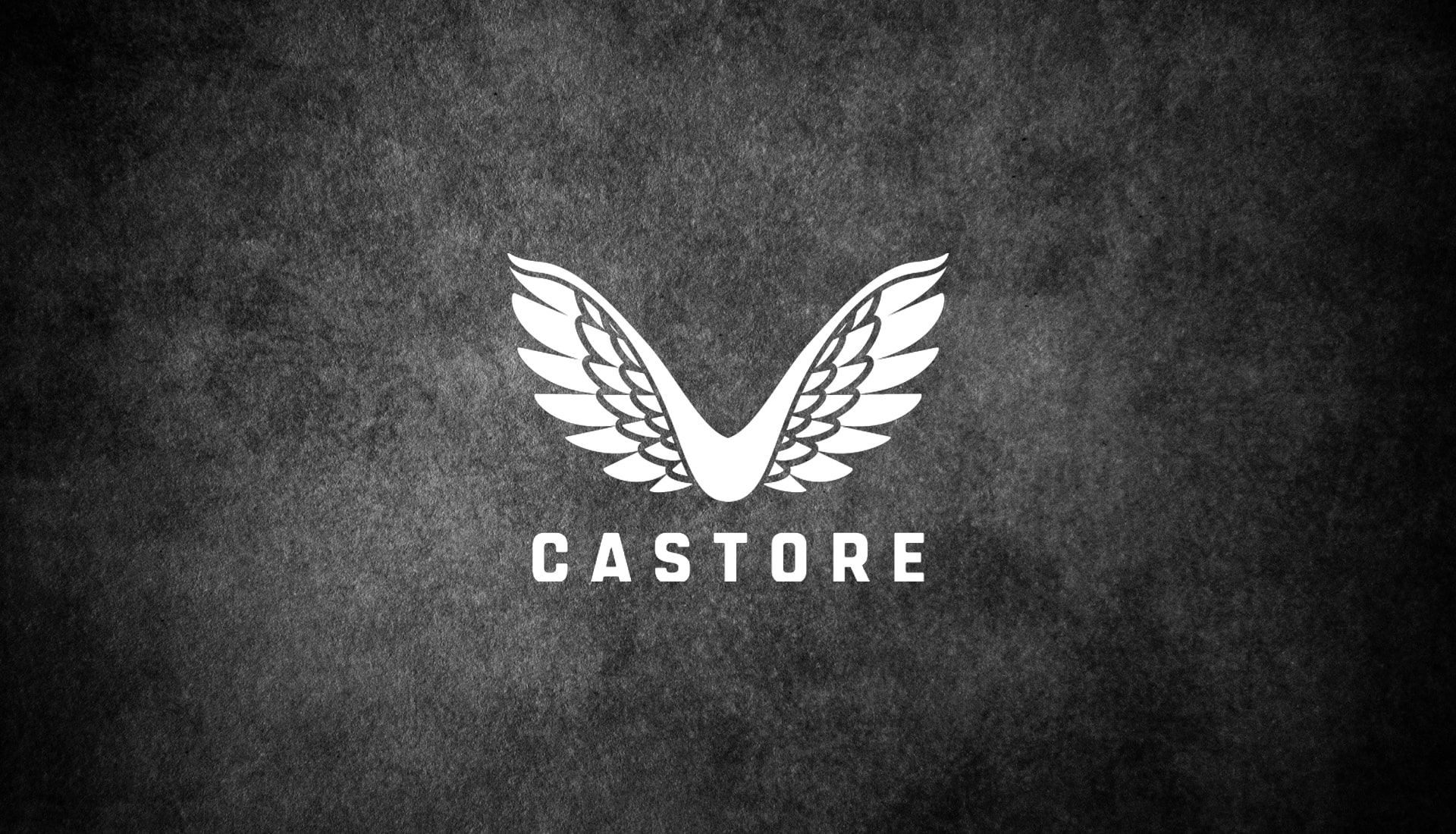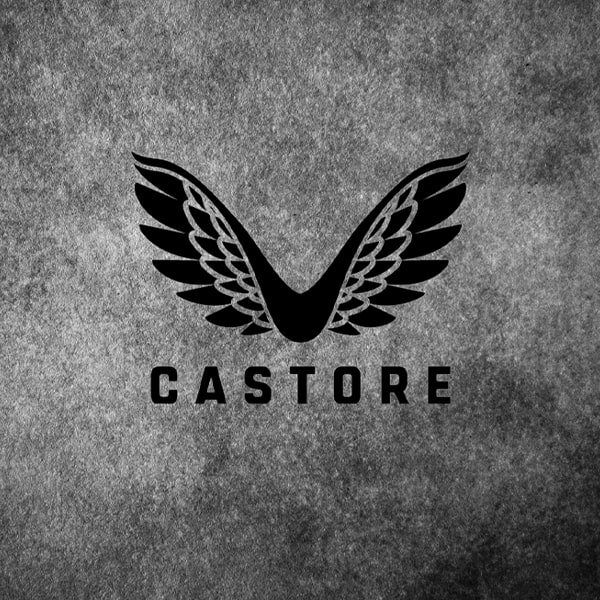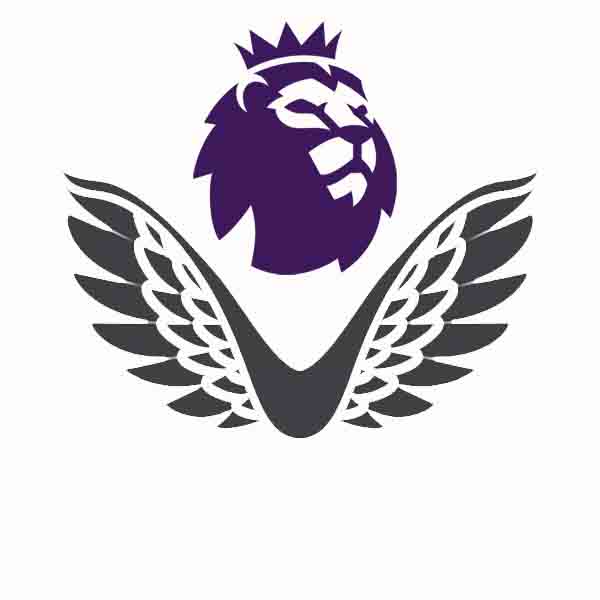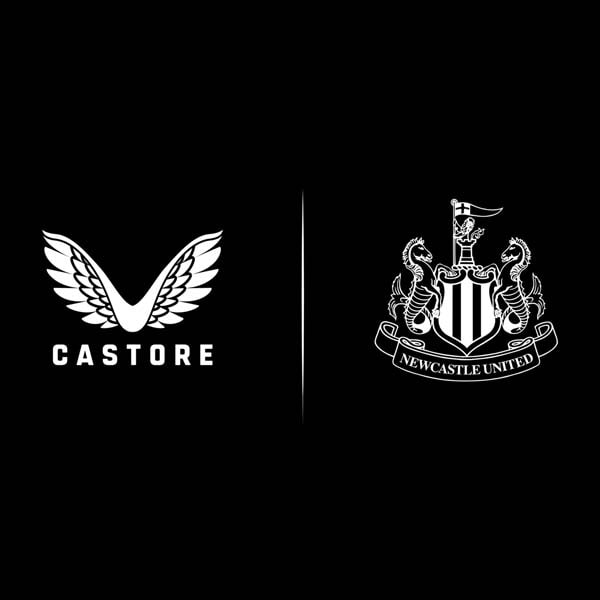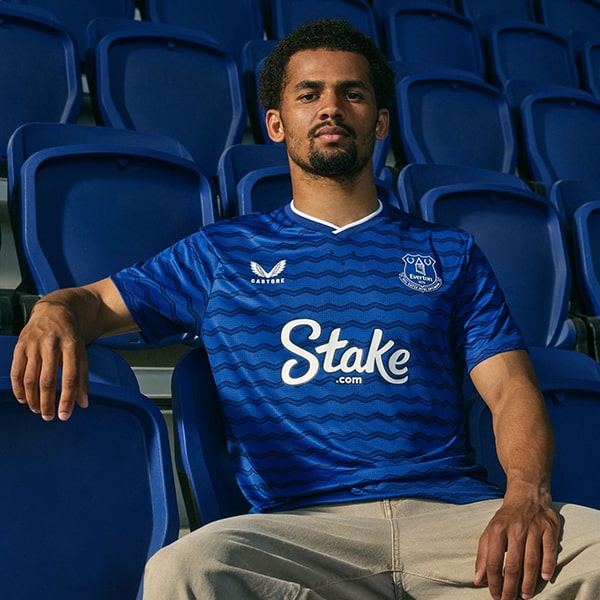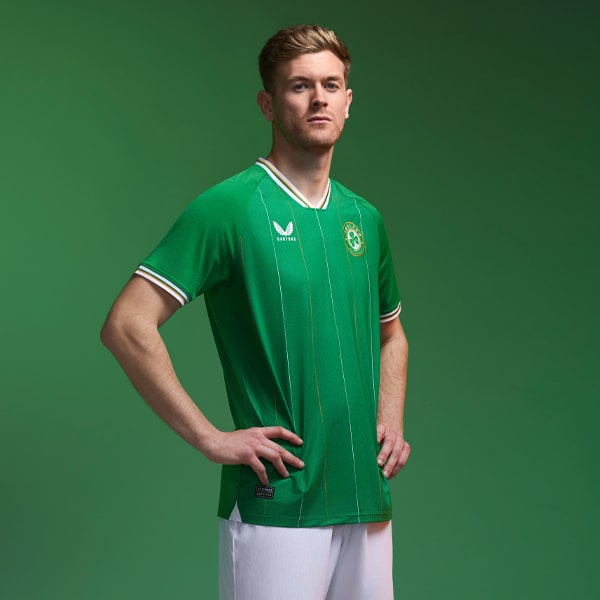Few companies in the sport retail market have had such a rise as that of Castore. Having recently broken onto the International football scene with the Republic of Ireland, we caught up with co-founder, Tom Beahon to get the inside story of the company’s journey, as well as what the future holds.
A new brand has emerged in the sporting world over the last few years, disrupting the status quo with their new approach and taking a foot hold in football, its position punctuated by being able to boast three Premier League teams on its roster already. But for those thinking that Castore has come out of nowhere, think again.
At 33 years old, co-founder Tom Beahon knows all about graft, having put ten years of his life into this project; his is a relentless, never-ending pursuit of perfection, a mindset that’s shared with his brother and fellow co-founder of Castore, and it’s perfectly encapsulated by the brand’s motto: “Better Never Stops.”
With that phrase acting as the driving force for all that the company do, Castore continually finds itself growing, year-on-year, breaking new ground with virtually every new contract. The latest huge leap came when they signed a deal to be the new technical sponsor for the Republic of Ireland, representing the brand’s first foray into the world of International football – but almost certainly not it’s last, if Beahon’s words are anything to go by.
Catching up with the older of the two young entrepreneurs and getting a sneak peek inside the company’s HQ while we were at it, we were keen to find out all about the brand, the journey of the brothers Beahon, and what the future holds for Castore, with seemingly no end to the ongoing growth and increasing number of worldwide teams signing with them. A deep dive, taking in some of the brand's biggest milestones, and also finding out what it was like to come face-to-face with Steven Gerrard in what was one of their first major forays into football.
In the best way, Castore has landed on the scene and for many it would look like rapid presence achieved in the game, in a very short space of time - how long has the grind been to get to this point though?
A lot longer! I always have people say to me exactly that – ‘Castore’s come out of nowhere and you guys have grown really quickly and I’ll be honest it does make me smile, because as you referenced, there’s a hell of a lot of hard work that happened a long time before. My brother and I started Castore when we were both young guys – I was 26 and Phil was 23. I’m now 33, and there was probably three years prior to that when we decided we wanted to start a company, so I was 23 – a decade ago now. And ever since, or from that moment that we decided we wanted to start a business, our whole lives have been focused on that singular goal.
I was living in London at the time, I had a normal job and before I started Castore I wouldn’t go out drinking or enjoying myself, wasn’t going on holiday, wasn’t doing any of the normal things that people enjoy, because we were using all of our money to start Castore. Any annual leave we had we’d be going over to Portugal to meet factories or Italy to meet fabric companies, and our whole lives were focused on this goal.
Fast forward a couple of years and as we got the idea off the ground and went through that process there was then at least two or two and a half years where we paid ourselves a thousand pounds a month, we’d taken on huge personal debt, like credit card debt, to get the business off the ground. Our mum and dad had remortgaged their house to help give us some money to get the business growing. So, we were living in this ball of … just stress and anxiety, thinking ‘oh my god, we need to make this thing a success. Success is the only option’.
So yeah, that was a long, long way from being glamorous, and there was a lot of grinding, of ‘well we don’t know if this is going to be successful, we’re just going to keep our heads down’. And that was where ‘Better Never Stops’, our brand ethos, came from, because we didn’t have this big vision at the time, we didn’t have a definition of success per se, we just knew we had to keep going, we’d put so much in we couldn’t fail and that morphed into whatever happens we’re just not going to stop, and that morphed into ‘Better Never Stops’.
All in all it’s probably not far off a decade in the making, but then as happens in life, when we entered the football market with Rangers – a strange time in the world with Covid, our first partnership and it was a huge partnership – once we’d done that, because Rangers are such a huge, globally know, globally respected club, things happened very quickly in a way that we never could’ve anticipated and there was so many teams that wanted to speak to us, because they were thinking ‘who’s this new brand that’s broken into the market?’. After that first one it all happened really quickly, but the preceding 10 years were anything but glamorous.
It really is an awesome story, coming from nowhere to compete with the likes of Nike, adidas and PUMA. I take it you’ve paid your mum and dad back though?
We have! [Laughs] But that was a big deal because I think for anyone starting a business it’s very stressful anyway, but you’ve got in the back of your mind ‘if we don’t make this successful, our mum and dad could be homeless’, and that is not a nice feeling. That instills something inside you. I don’t know what it is – just a sheer, bloody minded refusal to give up, which is probably not something they teach at Harvard business school, but it’s a good skill to have I think.
We thought well if no one else has come in and entered this market in the Premier League, why can’t we? Why can’t we partner with a global team?"
Was there a point for you then during the early days where you felt like either it was going to go somewhere or that you were going to have to stop?
It’s a good question, and the answer is no, there was never a feeling of ‘we’re going to stop’, I can hand on heart say that. There was never a feeling of this isn’t working, but that’s because it was working. The brand, we were just Castore at that time and we didn’t have all of these amazing partnerships, but we were growing revenue, there were customers buying the product, they were liking the product they were coming back and buying again, they were saying the product’s great, we really like it, it’s something different from Nike, adidas and PUMA, so it was working, it was just incredibly difficult. But because we could see those proof points that it was working, there was never a sense of ‘this is too difficult let’s give up’, but there was a sense of hunger and striving for how we could do more and get bigger.
Phil and I, we’d never wanted to create a lifestyle business where we got to a decent size and then left the office early on a Friday to go and play golf… that was never the ambition. It was always: we’ve put so much into this, it has to be big, hopefully one day a globally recognised brand. We couldn’t visualise that at the time, or articulate it in numerical terms or anything like that, it was just this inner feeling that we wanted to create something big, something that was worthy of all the sacrifices that we’ve been making. It’s that mindset that’s led us to the partnerships that we’ve done, because again, I think a lot of people will have said that if you’re going to go into football, start at the bottom, learn your trade, make your mistakes, and work your way up gradually.
If you were to do this by textbook, it’d be start in league two, work your way up and maybe in five or six years you might get a Premier League team, but because we’d aways had this ambitious, driven, maybe a bit of a chip-on-your shoulder attitude, we thought well if no one else has come in and entered this market in the Premier League, why can’t we? Why can’t we partner with a global team like Rangers, so there’s always that desire to want to do things differently, to want to prove people wrong I think.
What do you make of the market as a whole - what space can you carve out or moreover, what space was missing that your brand now owns?
It’s an incredibly interesting and exciting market and I think it’s being driven by a number of exciting accu-trends. Number one, I think sport and football in particular is globalising in a way that it never has before. There’s people all over the world now watching not just the Premier League, but the Championship, League One, and there is a demand and an appetite from fans in every corner of the globe for high quality football content. That is a really exciting fact in itself.
Then secondly, I think the market for football is digitising in a way that it never has done before, where fans are engaging with their team via digital platforms, as well as of course, going to the stadiums on a Saturday afternoon. But you can only do that once a week and a fan’s interest in a team doesn’t stop at 5pm on a Saturday; they’re just as interested on a Monday morning or Tuesday afternoon, so engaging with fans through digital platforms, particularly that global fanbase, I think is really interesting, and it’s those two elements that engage us.
For us this was always passion focused, it was passion first. We were both born and raised on Merseyside, we grew up on lower league football, I wanted to be a professional footballer, so the start for us was always passion. We wanted to go into football because we loved football. But when we applied more of an analytical focus to that passion, we could see that there was more fans than ever before engaging with these teams and they’re engaging via digital platforms – we’re a digital brand – there’s got to be an opportunity for us to come in and offer a team something that the traditional brands hadn’t necessarily thought of, because the market had always been physical, store-led.
There had not been many new entrants, and it was really the status quo that dominated. There hadn’t been much innovation or disruption, and we felt again, maybe with that chip on our shoulder, well why can’t we come in and offer something different and cover this from a digital perspective, backed by the success that we’d had.
We are the challenger brand, and we need to be working whilst our competitors are asleep; we need to be dreaming up ideas that they would never even imagine, we need to be taking risks, be bolder, be more innovative, all of that stuff."
You obviously talk about football and your passion for it but you didn’t start with football, rather you made your way in having started with other sports. Was that always the aim, and what part did football play over other sports that you’ve embraced?
I get asked that question and I never quite know what the answer is. There’s two answers to it. Firstly, when we started Castore the ambition was that we wanted to create a global brand, because if we were going to dedicate our lives to something there was no plan B, no going back, there was none of it, it was win or die. And against that backdrop we said, well it’s got to be big. If we’re going to do this and make it work, it’s got to be big. And if you’re a global sportswear brand then you need to be in a global sport, and football is absolutely the most popular sport in the world.
So, the mindset was always that if we could get it going that we would go and partner with football teams, but I’d be lying if I said that I sat there at the start and thought to myself that Rangers might be available one day, or Newcastle, or Bayer Leverkusen. I just didn’t think like that because you’re in survival mode. Everyday you’re fighting, you’re in the trenches, you’re trying to make enough revenue on your website to buy dinner that evening.
These grand ideas of what we’ve done here… it was just get through the day, get through the week, get through the month, and it was only a couple of years in that we felt that OK, we’ve got this brand going, it works, we’ve got customers and they love the product quality, they liked the premium British brand, they engage with ‘Better Never Stops’… it was only then that everything that we dreamed about at the start, like maybe one day we could partner with a football team, did that feel real, and they quickly became real in a very big way.
As a brand, you’ve hit loads of milestones already, whether it be Andy Murray, the England Cricket team, Rangers, breaking into the Premier League – was there a specific point that made you think ‘we’ve made it’?
Honestly, no, and that’s not a false modesty thing, that’s honest to god truth… I am constantly paranoid, and as a founder you have to be, and my brother is the same. You’re always thinking ‘what if this goes wrong, what if that goes wrong’. Football in particular and I guess the sportswear market more generally is fiercely competitive. If you think for one second ‘oh, I’ve mastered this’ or ’I’ve got this’ there is someone waiting out there to eat you. We are the challenger brand, and we need to be working whilst our competitors are asleep; we need to be dreaming up ideas that they would never even imagine, we need to be taking risks, be bolder, be more innovative, all of that stuff.
So, I can honestly say, whether it was Andy, which was an amazing milestone, the England Cricket Team, our home nation, so really special, Ireland football, our first international football team, Rangers, Newcastle, Sevilla and Leverkusen as our first Champions League teams, these moments that are all amazing, but you never stop. People say that you should, but you can’t, because it’s all about where can we improve, what’s the next opportunity, what’s the next challenge. And those two things are not mutually exclusive.
You wouldn’t get to where you’ve got to without that attitude, so therefore you wouldn’t be the kind of person that said ‘great, we’ve just done Rangers and they’ve won the league, I’m going to take a week off and go to Barbados'. You’re either that type of person that’s got the drive and ambition to get there and bask in it when those cool things happen, or it just instills that hunger for more. That’s a common thing; when you get a bit of success it just instills a hunger for more and that’s always what we’ve been like. There’s never been an ‘oh, we’ve made it’.
It’s a really healthy mindset, and it reminds us of elite athletes – you win something, and focus is straight on to the next thing. Retirement is the time for reflection, when you can have your feet up in Barbados, looking back on how well you’ve done…
It’s a really good analogy, and there’s definitely comparisons with elite athletes. I’ve obviously got to know Andy Murray quite well as a long-term brand partner, and he has exactly that mindset: pushing, pushing, marginal gains, details, willing to make sacrifices that his competitors aren’t, constantly looking to push the boundaries, whether it’s through nutrition or doing yoga, or whatever it is, he wants to find that edge, the same as Adam Peaty, so I think you’re right, there’s definitely a lot of comparisons.
What I think is interesting is, for a football team, there’s 11 of them, or 20 in a squad, it’s fairly small. So, you need 20 people singing from the same hymn sheet. In business, Castore is more than 500 people now, and that’s a very different challenge, getting 500 people excited and driven and passionate and hardworking and committed and paranoid as me and my brother are. That’s a very difficult and different challenge, and building a culture where those values permeate throughout the organisation is the difference between being a good brand or business and a great one.
Choosing a kit partner is a big deal for a team because the players are wearing this on their backs… it’s the tools of their trade."
In your words, how would you describe the sentiment of the brand?
We always wanted from day one, from before we started Castore, for the brand to be the number one British Sportswear brand, competing on a global stage. I’m pretty competitive and ambitious by nature, but to sit here and say we want to be bigger than Nike, who boast 10s of millions in revenue, for me that feels like a massive challenge. But to be the number one British Sportswear Brand, competing, going blow for blow, it’s a reasonable ambition, and a reason to get out of bed at five am every morning with a smile on my face.
I grew up looking at Reebok and Umbro, British Sportswear brands that sold their businesses: Umbro got sold to Nike and Reebok to adidas, and it’s maybe controversial to say, but they maybe haven’t quite been the same brands since that happened. We don’t want to do that with Castore. We want to stand on our own two feet and be a British brand that competes with the big guys. Adidas and PUMA did it out of Germany, Nike, of course and Under Armour and New Balance have done it out of America, so why can’t someone do it out of Britain.
We’ve obviously touched on milestones, but for you personally, can you pick one that stands out as your favourite, for example walking in and speaking to Rangers to get that over the line?
It’s a good question… I don’t know about favourite, but you’ve used a good example. When we got Rangers, that was our first one, and the manager at the time was Steven Gerrard, and as someone who grew up on Merseyside… Steven Gerrard is Steven Gerrard. When we were doing that deal and going through that partnership and I met Steven and was telling him about my brand and why we’d be a great partner for Rangers and what we could bring to the table and all of that stuff, it was one of those surreal moments where I was just like, ‘what has my life become!’ I never could’ve dreamed about that.
When I was in the trenches and we were trying to build Castore we were looking at the revenue every single day, trying to make enough money, and it kind of felt like a click of the fingers later that I’m then pitching my brand to Steven Gerrard, trying to win this massive deal with this globally recognised team… that was definitely a surreal moment and then Ireland has definitely been a big one, the Football Association of Ireland. I grew up remembering the ’94 team when they beat Italy, Roy Keane in Japan and South Korea… Ireland have always been a team that punch above their weight and that is exactly what I want Castore to be: we’re not the biggest brand in the market, but we always challenge the big guys and punch above our weight.
So, there’s a really nice similarity and ethos with the FAI. It’s another one that I couldn’t have, in my wildest dreams, think that we could partner with an international team. There’s the women’s World Cup coming up this summer in Australia and New Zealand, and that’s going to be one of those amazing moments. Going to Seville to watch Rangers in the Europa League final even though it wasn’t the result that we wanted… these are genuine pinch me moments, like how the hell have we got here. Newcastle at the Carabao Cup final at Wembley, seeing the Toon Army at Trafalgar Square. It’s amazing just thinking that we’re involved with this… this is what we do for a living!
Going back to Gerrard, how involved was he in that Rangers deal?
It depends on the team, there’s no set rules and it’s case by case, but it’s true to say that choosing a kit partner is a big deal for a team. Obviously, it’s a big deal commercially, the numbers involved are not small, but it’s also a big deal because the players are wearing this on their backs… it’s the tools of their trade, so having the manager and the coaching staff having some oversight and involvement in the process is really important. And because Castore was a new entity to the market, at that time it was Steven and Gary MacAllister and a few others, it was important for them to have that confidence that yeah, we could produce some nice sports kit – we were doing Andy Murray at the time – but can you produce a football kit good enough for our team, because marginal gains, details, matter, and if your kit is not up to scratch then we’re not going to let it affect our team. I think they just wanted to have that oversight and rubber stamp it, hearing it from the founder that, yeah guys, we’ve been preparing for this moment for a long time and we’re ready to take it on.
It does depend on the team though, but having management and playing staff bought into your brand and your product is definitely helpful when you’re trying to win these major partnerships.
That just lends to this unbelievable story – not only were you going to Rangers, but you were facing Gerrard, MacAllister… what a moment.
What made it so surreal was I remember phoning my brother afterwards and he asked how the meeting went, and I said ‘Yeah, just met and pitched the business to Steven Gerrard.’ It was one of these crazy moments.
I think the convergence of sport and wider popular culture, streetwear, fashion lifestyle, music… I think that is an incredibly interesting area, because football is not just a sport… it goes beyond that, it touches people’s lives in a way that almost nothing else can"
We’ve touched on it already, but the success – that must lead to hunger for more?
Absolutely. People think that success is a simple upward trajectory, and it’s never like that. It’s very much that you get knocked in the face and you push yourself down and you get back up… you’ve got to have so much resilience, because with success inevitably comes challenges. To achieve anything meaningful you have to come out of your comfort zone, and when you’re out of your comfort zone you make mistakes, you’re always learning. And football is a heavily or intensely scrutinised market, it’s not like if you make a mistake no one notices. Everyone is going to see and you have to learn that the level of resilience required to not just accept that yeah, OK, we’ll slow things down and take things nice and slow and easy. We’ve always been driven by if we’re going to be the best British sportswear brand competing on the global stage then we have to be ambitious, we have to be driven, we have to keep going forwards, and the success only reinforces that mindset.
Great mindset to have. Sort of like, aim for the moon and if you miss you end up in the stars…
It sounds simple, but it’s true. I think a lot of people say that, and we all live in a social media world these days that maybe feeds this inaccurate view that you can post a picture on Instagram or TikTok and you get a lot of followers and you go viral and then life’s great. And maybe that’s true for some people, but in the most part it’s the opposite; you have to do a lot, you have to go through pain and suffering and hardship and challenges, but if you can keep going then that’s where the rewards are, at the other end of those moments.
We’ve touched on Ireland, but is the aim now to push further in the International scene?
I think the international market is definitely an interesting one, because outside of the big brands, the big three, there’s not that many other players. But there’s a lot of countries, a lot of them really ambitious, and for Castore we always ask ourselves the question: what could we do differently and better?
We’ve got to be able to look ourselves and our partners in the eye and say that we can bring something different and better than those guys to this partnership. Might be bespoke designs, might be limited edition product launches, might be a more digital focus in terms of how we want to market to people. Ireland of course has a big ex pat community in America, Australia, the Far East, so how do we connect the team to that audience. Bringing those points of difference to the partnership is really important to us and with Ireland we felt like we had a lot there that we could do, and hopefully there’s going to be some other teams as well that we’ll be able to do that for in due course.
There’s obviously the performance element to jerseys, but more and more we’re seeing lifestyle crossovers with jersey culture. Is that something as a brand that you’re conscious of and do you have any plans in that regard?
I think the convergence of sport and wider popular culture, streetwear, fashion lifestyle, music… I think that is an incredibly interesting area, because football is not just a sport… it goes beyond that, it touches people’s lives in a way that almost nothing else can. Again, we always challenge ourselves on where can we be different, where can we find an angle that maybe other people haven’t seen, and often the answer to that is in product designs, taking a moment out of a club’s history or heritage or something that’s unique to that team, and doing something exciting with that moment. If you can combine that with a fan of the team that happens to be a musician or something else from that culture, and you can bring those elements together, merging music culture, fashion, streetwear with the core footballing ethos – and I think it’s important you never lose that authenticity around a club – but that for me would be an incredibly exciting arena that I think we’re going to see grow a lot.
I want Castore to be a global brand, globally recognised and hopefully globally respected for being genuinely passionate about athletes, creating products that make athletes better, and we’re the living embodiment of our ‘Better Never Stops’ ethos"
What inspires you personally, and what inspires the brand?
From a brand perspective I love the great British brands, so McClaren, that is a British brand that creates a phenomenal product and competes and is recognised on the global stage. I love that. Burberry, similarly, a proudly British brand that creates an amazing product, competes on the global stage, globally recognised, Range Rover, Dyson – completely different sector to ours, highly innovative, technologically advanced, pushing the boundaries of performance in its particular area, built an amazing brand and again, now globally recognised. It’s the great British brands that have gone beyond our shores and have become globally recognised and respected – they’re the ones that I really love.
From a personal perspective… I don’t know really… I don’t have a picture of someone on my wall that I salute and pledge allegiance to each and every morning. I think carving our own path is really the main thing that drives us. But, it’d be entrepreneurs that I admire… your Steve Jobs, your Jeff Besos, your James Dyson – people that have created something that without them, would not have existed. They have willed it into existence. I love that mindset of you don’t necessarily need to be the smartest person in the room, but you need to be the hardest working and most resilient. If you can be that person, you can do things that normal people wouldn’t think are achievable. And it’s these entrepreneurs that have that spirit of I am going to envisage something in my mind and then will it into existence, they’re the ones I really respect and admire.
You must be asked so often – “where do you see the brand in five years” but more punching – what emotional levels do you want the brand to hit?
For the brand, there’s no doubt that I want Castore to be a global brand, globally recognised and hopefully globally respected for being genuinely passionate about athletes, creating products that make athletes better, and we’re the living embodiment of our ‘Better Never Stops’ ethos. Better Never Stops was not something that we paid an expensive marketing agency to come up with. We had no money when we started Castore, and Better Never Stops was something that morphed into existence through the experiences that we were going through at that time. We can’t give up. We don’t know what the future looks like, but just don’t give up, one step at a time. And that really is a great embodiment of if you want to be successful in life, no matter what it is, could be business or your career or anything, just having that mindset is incredibly invaluable.
If we can become respected for that and use it to inspire athletes to be the best that they can be, whatever their level, whether it’s Andy Murray, Adam Peaty, or a guy or girl that wants to get off the sofa and give something a go for the first time, and when it gets to football, they stick with it, I would love Castore to be recognised and respected around the world for that. If people know us as a brand that’s passionate about what we do, creating products and inspiring athletes, I’ll be a happy man.
Finally then, the name Castore – what’s the story behind that?
Castore comes from a story of Greek Mythology. If you went to a school like mine, no one taught Greek mythology, so we had to work this out for ourselves, but in Greek mythology, Castor was one of two brothers – Castor and Pollox. Those two brothers challenged the Greek god, Zeus, and Phil and I thought it was a nice analogy for us challenging the big guys of the sportswear world. And being the highly intelligent and insightful individuals that we are, we felt Castore was a better name than Pollox! We’ve made a lot of mistakes in the last seven years, but I think we got that one right [laughs].
Pick up the Republic of Ireland 2023 away shirt at prodirectsport.com/soccer
